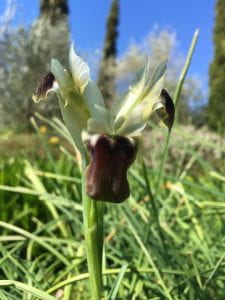Volunteers in the spotlight
By Nicola Temple
This is my first day visiting the garden on a Tuesday. It’s a whole new set of faces around the coffee table as each day of the week brings with it a new set of volunteer gardeners at the Botanic Garden. I’ve brought some home-made cookies – a sort of bribe or peace offering I suppose. You see, I want to drag a few of these lovely volunteers away from their work for a few minutes to ask them about what motivates them to keep coming back to the garden, donating their precious time, week after week, year after year. (more…)
Unusual Widow Iris brings a smile
By Nick Wray
 The early spring blossom is in full swing with white, pink and yellow blooms appearing everywhere, so it seems a little subdued to talk about a black flower. Its name also is somewhat sombre. Widow Iris, Iris tuberosa is one of only a few flowers of the 400,000 species of plants on the planet with black flowers. Or at least that’s how they seem to the human eye. In fact, there are no truly black flowers as there are no plant pigments that are black. The black part of the flower, its sepals (known as falls in Iris) are saturated in anthocyanins and the part of the light spectrum reflected back at us gives a black colour (or at least the appearance of one). Secondly, this colour only appears on the sepals, with petals in various shades of green, olive and brown. This combination, like is common name, is powerful and makes for a charming plant, if a little difficult to spot in the garden. But persistent tubers ensure that it appears in winter with linear grass-like foliage that is quadrangular in section (the only Iris to do so), followed in March by the extraordinary flowers. Warmth and shelter are what this curiosity needs, to mimic its Mediterranean home and a summer baking. From France across the countries that make up southern Europe to Turkey, mild winters and warm springs allow this extraordinary iris to establish. The base of a sunny wall or in a sunny grassy bank with spring bulbs, full light and full sun in summer and patience for plants to bulk up and this black sheep of the Iris world will make your garden its new home. (more…)
The early spring blossom is in full swing with white, pink and yellow blooms appearing everywhere, so it seems a little subdued to talk about a black flower. Its name also is somewhat sombre. Widow Iris, Iris tuberosa is one of only a few flowers of the 400,000 species of plants on the planet with black flowers. Or at least that’s how they seem to the human eye. In fact, there are no truly black flowers as there are no plant pigments that are black. The black part of the flower, its sepals (known as falls in Iris) are saturated in anthocyanins and the part of the light spectrum reflected back at us gives a black colour (or at least the appearance of one). Secondly, this colour only appears on the sepals, with petals in various shades of green, olive and brown. This combination, like is common name, is powerful and makes for a charming plant, if a little difficult to spot in the garden. But persistent tubers ensure that it appears in winter with linear grass-like foliage that is quadrangular in section (the only Iris to do so), followed in March by the extraordinary flowers. Warmth and shelter are what this curiosity needs, to mimic its Mediterranean home and a summer baking. From France across the countries that make up southern Europe to Turkey, mild winters and warm springs allow this extraordinary iris to establish. The base of a sunny wall or in a sunny grassy bank with spring bulbs, full light and full sun in summer and patience for plants to bulk up and this black sheep of the Iris world will make your garden its new home. (more…)
Undergraduates get their first glimpse at the garden
By Alida Robey
I’ve been promising myself a visit to the University of Bristol Botanic Garden since I arrived in Bristol four years ago. Life has intervened. Yet when the opportunity came to join the new intake of students from the University on their first practical of their 3 year undergraduate degree, I leapt at the chance.
Once there, the thrill of the plants, garden, stories and mysteries within, were hard to resist! I joined the briefing given by the Garden’s curator, Nick Wray, as he introduced the day’s second group of 70 students (over 250 students attended the practical over two days) to their PhD student demonstrators – there to inspire the undergraduates about different aspects of the gardens.

